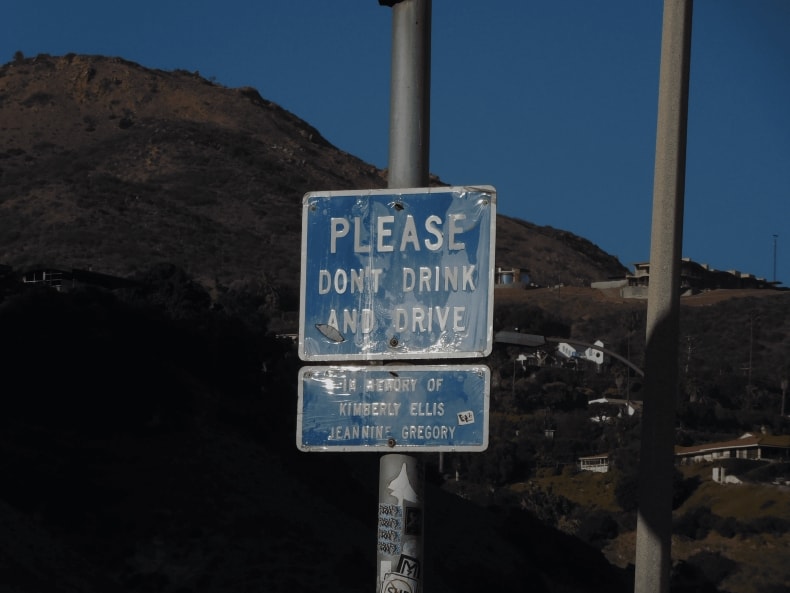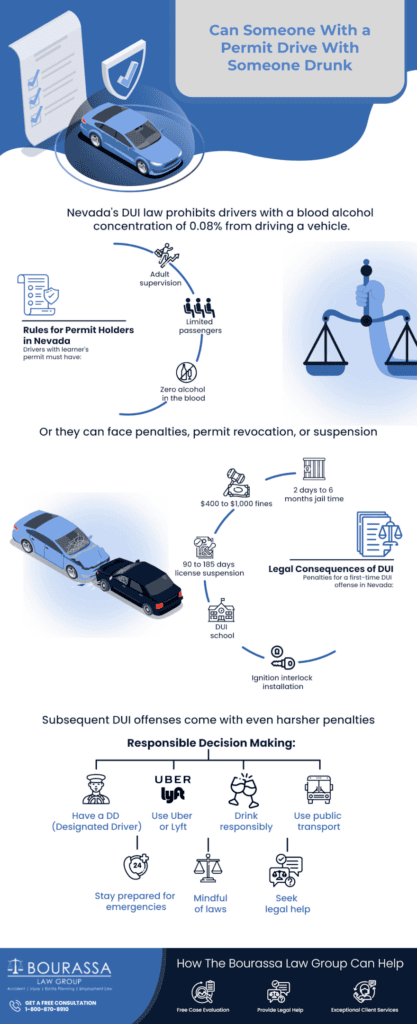
Driving under the influence (DUI) is a serious offense with potentially life-altering consequences. In Nevada, like in many other states, strict laws are in place to combat impaired driving. But what about individuals with a driver’s permit? Can they drive with someone who’s had a few too many? In this article, we’ll explore the details of permits, intoxication, and the legal consequences of driving with a drunk person in the Silver State.
Understanding Nevada’s DUI Laws
Before we get into the specifics of permits and driving with an intoxicated person, it’s crucial to understand the basics of Nevada’s DUI laws. These laws are designed to discourage people from driving while impaired and to ensure the safety of all road users.
In Nevada, a DUI is defined as operating a motor vehicle with a blood alcohol concentration (BAC) of 0.08% or higher. It’s essential to note that penalties can still apply even if a drunk driver is found to be impaired below this threshold.
Driving with a Permit
A driver’s permit, often referred to as a learner’s permit, is a provisional license that allows young drivers to practice driving under certain conditions. It’s an important stepping stone for a young driver on the path to becoming a licensed driver. But what are the rules for a learner driver when it comes to driving with a drunk adult?
The answer to this question lies in the conditions and restrictions associated with a learner’s permit in Nevada. A learner driver is subject to specific rules which aim to ensure the safety of both the permit holder and others on the road.
Rules for Permit Holders in Nevada
Supervised Driving: In Nevada, a learner’s permit typically allows the holder to drive under the supervision of a licensed adult who is at least 21 years old and has held a valid driver’s license for at least one year. The supervisory driver, whether it’s a licensed parent or another adult, must be seated in the front seat, and there are no restrictions on the passenger’s age.
Restrictions on Passengers: Nevada’s regulations for permit holders limit the number of passengers to the supervising adult and immediate family members in the vehicle. While there aren’t specific rules about the sobriety of passengers, it’s crucial to remember that supervising drivers must be sober and capable of taking control of the vehicle if needed.
Zero Tolerance for Alcohol: One crucial rule for permit holders is the absolute prohibition of alcohol. Regardless of who’s in the passenger seat, the driver must have no impairing substances or alcohol in their system when driving. Any amount of alcohol is prohibited, and even a minimal BAC can result in severe legal consequences.
Implications of Driving with an Intoxicated Passenger as a Permit Holder in Nevada
Driving with an intoxicated passenger while holding a provisional license in Nevada may not be explicitly forbidden, but it does come with its own set of risks and potential legal repercussions.
Supervising Adult Responsibility: If you choose to drive with drunk adults while holding a permit, it’s crucial to have a sober supervising adult in the car. The supervising adult should be prepared to get behind the wheel and take control of the vehicle if needed to ensure the safety of everyone on board.
BAC Limit: As previously mentioned, permit holders are held to a strict zero-tolerance policy concerning alcohol. If you have any amount of alcohol in your system while driving, you could face penalties, including the suspension or revocation of your permit.
Potential Liability: In the unfortunate event of an accident or any legal issues, driving with an intoxicated passenger can complicate matters significantly. If an incident occurs and it’s determined that you were impaired or behaving irresponsibly as a permit holder, you could be subject to legal consequences.
It’s essential to bear in mind that although there may not be a specific law prohibiting driving with an intoxicated passenger as a permit holder, you are still subject to the broader DUI laws in Nevada. These laws are designed to discourage impaired driving and promote road safety, and they apply to all drivers, regardless of their license type.

Understanding the Legal Ramifications of DUI in Nevada
If you’re curious about the possible legal repercussions of driving under the influence in Nevada, it’s crucial to recognize that the penalties can be quite harsh. These consequences extend to all individuals apprehended by law enforcement on DUI charges, including those with learner’s permits who run afoul of the zero-tolerance policy.
Penalties for a first-time DUI offense in Nevada may include:
Jail time, ranging from 2 days to 6 months.
Fines and administrative fees ranging from $400 to $1,000.
Suspension of your license for 90 days to 185 days.
Mandatory attendance at DUI school or treatment programs.
Installation of an ignition interlock device in your vehicle.
Subsequent DUI offenses come with even harsher penalties, including longer license suspensions, mandatory prison sentences, and increased fines.
Tips for Making Responsible Decisions With an Intoxicated Passenger
Making responsible decisions regarding driving with an intoxicated passenger is vital for the safety of everyone involved and to steer clear of potential legal trouble. Here are some essential tips to keep in mind:
Have a Sober Designated Driver: To ensure a safe ride home, having a designated driver who remains sober and takes responsibility for getting everyone back safely is your best bet. If you’re an inexperienced driver with a learner’s license, this person can also double as the supervising adult in line with Nevada’s learner’s license rules.
Use Ridesharing Services: Ridesharing services like Uber and Lyft are readily available in most parts of Nevada. They provide a convenient and safe alternative to driving if someone in your group has been drinking. Using these services can help you avoid any potential legal issues and, more importantly, protect lives.
Encourage Responsible Drinking: When you’re out with friends or family who are drinking, encourage responsible drinking habits. This includes keeping an eye on the number of drinks, consuming food, and staying hydrated. Responsible drinking goes a long way in ensuring that nobody becomes dangerously intoxicated.
Be Informed About Local Transportation Options: Knowing the transportation options available in your area is crucial. Many Nevada cities have public transportation systems, such as buses and trains, providing a safe and sober way to get home. Get to know these options, so you have a backup plan if driving isn’t a safe choice.
Be Prepared for Emergencies: In any situation, it’s essential to be prepared for emergencies. Keep your phone charged, know the location of the nearest hospital or urgent care center, and have a plan in case someone in your group requires medical attention.
Be Mindful of the Zero-Tolerance Policy: As a permit holder, always bear in mind that Nevada enforces a zero-tolerance policy for alcohol. Even a small amount of alcohol in your system can lead to legal consequences. It’s wisest to err on the side of caution and avoid alcohol consumption if you plan to drive.
Consult Legal Advice: If you have any doubts or concerns about the legal implications of your specific situation, it’s a wise move to consult with a legal professional. They can provide tailored guidance and help you make well-informed decisions.

BLG’s Reliable Lawyers Guide You at Every Step of the Way
In Nevada, the rules about permit holders driving with intoxicated passengers are nuanced. While there’s no direct law against it, those with a permit still fall under the state’s strict DUI regulations and a zero-tolerance policy for alcohol.
If you’re considering driving with someone who’s been drinking, it’s crucial to have a sober and responsible adult supervising. Breaking the zero-tolerance rule can result in hefty fines, license suspension, and other legal repercussions.
Seeking a car accident attorney for your DUI case? Let BLG’s experienced attorneys guide you through Nevada’s legal complexities. Reach out to us at 1-800-870-8910 to book a free consultation call.





